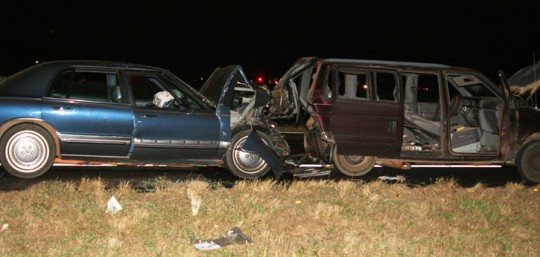House, Senate Look At Ditching No Fault Insurance
November 6, 2013
A House Republican is driving forward with plans to replace the state’s “no-fault” auto insurance coverage, two years after lawmakers passed reforms to try to rid the system of fraud.
However, the proposal continues to be reviewed in a “deliberative and thoughtful manner” in the Senate as a number of insurance officials have tempered their call for a change after a constitutional challenge to the 2012 reform law was recently sidetracked.
 Rep. Carlos Trujillo, R-Miami, on Tuesday filed two measures (HB 267 and HB 269) directed at making bodily injury coverage, which a vast majority of motorists in Florida already purchase, the replacement for no-fault.
Rep. Carlos Trujillo, R-Miami, on Tuesday filed two measures (HB 267 and HB 269) directed at making bodily injury coverage, which a vast majority of motorists in Florida already purchase, the replacement for no-fault.
The measures replicate a draft being put together by Senate Banking and Insurance Chairman David Simmons, R-Altamonte Springs.
Simmons said he will continue to gather input on the proposal after his committee reviewed the potential change on Tuesday.
Simmons had been advancing the measure at the request of some insurance officials who said they didn’t expect reforms to the decades-old Personal Injury Protection (PIP) auto insurance system — also known as no-fault — to fully take hold.
But Simmons noted that some of those advocates have taken a wait-and-see attitude after the 1st District Court of Appeal tossed out a challenge to the law Oct. 23. The court found that an acupuncturist, a chiropractor, two massage therapists, a hypothetical “John Doe” representing health-care providers and a hypothetical “Jane Doe” representing motorists lacked legal standing.
Michael Carlson, executive director of the Personal Insurance Federation of Florida, a three-year-old trade association which includes Allstate, Progressive and State Farm, was among those on Tuesday saying the Legislature should continue to see if the 2012 reforms hold.
“There’s some very, very initial trend data showing that some claims are decreasing,” Carlson said. “It seems to indicate some of the costs in the system are being addressed. We’re hopeful the (HB) 119 reforms will continue to address those costs.”
Donovan Brown, state government relations counsel for the Property Casualty Insurers Association of America, also encouraged lawmakers to give the 2012 law time to work.
“After nearly a year and a lawsuit later, the reforms finally have the ability to be fully implemented,” Brown stated.
Still, Simmons said language in the appeals-court ruling indicates the no-fault system doesn’t have a future.
The court “told us the wrong plaintiffs were involved in that lawsuit but certainly used language that would indicate that there are significant questions that need to be resolved of the 2012 amendments,” Simmons said.
“That 1st DCA opinion, decision provides no solace to an insurance company who is trying to deal with PIP,” Simmons continued. “As someone told me, it’s just a stay of execution.”
Instead of a “hypothetical claim,” the plaintiffs failed to offer a “factual” motorist who is harmed by the law, the judges wrote.
The order reversed a March ruling by Leon County Circuit Judge Terry Lewis, who said the law illegally prevented accident patients from using PIP claims to pay for treatment by acupuncturists and massage therapists and limited services from chiropractors.
Lewis also found fault with the law’s lower limit on how much will be paid for non-emergency medical care.
The 2012 law, signed by Gov. Rick Scott and backed by Chief Financial Officer Jeff Atwater, requires that people involved in motor vehicle crashes seek treatment within 14 days and allows up to $10,000 in benefits for emergency medical conditions and $2,500 for non-emergency conditions.
The bill was considered a last ditch effort to maintain the PIP system, which requires motorists to carry $10,000 in medical coverage.
Ditching no-fault for bodily-injury, which provides coverage if a motorist causes an accident that hurts someone else, is expected to put more questions of medical coverage into the courts as injured parties seek to recoup expenses from at-fault drivers.
Gerald Wester, a lobbyist for the American Insurance Association, said PIP continues to see fraud and recommended that if the Legislature were to change the system, bodily injury should have minimum of $10,000 coverage for a single person injured in an accident and $20,000 for all liable injuries in an accident.
Wester, Paul Sanford, legislative counsel for Blue Cross and Blue Shield of Florida and the American Council of Life Insurers, and Paul Jess, the general counsel and deputy executive director of the Florida Justice Association, recommended that the changes in the insurance system include a form of “Medical Payments to Others” — also known as Med Pay — that covers medical payments for all passengers in a vehicle if they are injured in an accident.
Sandra Starnes, Florida Office of Insurance Regulation director of property & casualty product review, said eliminating no-fault could result in savings for most drivers, with the most significant savings in South and Central Florida, where PIP fraud has been most prevalent.
by Jim Turner, The News Service of Florida
NorthEscambia.com file photo, click to enlarge.



Comments